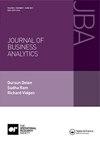Forecasting natural gas consumption in residential and commercial sectors in the US
IF 1.6
Q3 COMPUTER SCIENCE, INFORMATION SYSTEMS
引用次数: 0
Abstract
ABSTRACT The paper proposes a parallel forecasting approach for weekly natural gas consumption in the US residential and commercial sectors, which models scrape data and ratio data separately and then combines the outputs to generate the forecasts. To improve forecasting accuracy, both semi-parametric and nonparametric models, including dynamic linear regression model and dynamic semi-parametric model, are adopted to model the effects of weather variables, and time series techniques are employed to address the serial correlation exhibited by the data. An algorithm focusing on forecasting accuracy is proposed to select the smoothing parameter for serially correlated data. The proposed model is empirically tested using data in the New England area from 2013 to 2018 and benchmarked against some deep learning approaches including Deep Neural Network, Long Short-Term Memory Neural Network, and Gated Recurrent Unit Neural Network methods. Overall, the results show that the proposed approach performs well in generating accurate forecasts.预测美国住宅和商业部门的天然气消费量
摘要:本文提出了一种美国住宅和商业部门每周天然气消费量的并行预测方法,该方法分别对抓取数据和比值数据进行建模,然后将输出结果结合起来生成预测结果。为了提高预报精度,采用半参数和非参数模型,包括动态线性回归模型和动态半参数模型来模拟天气变量的影响,并采用时间序列技术来解决数据所表现出的序列相关性。针对序列相关数据,提出了一种以预测精度为重点的平滑参数选择算法。该模型使用2013年至2018年新英格兰地区的数据进行了实证测试,并与深度神经网络、长短期记忆神经网络和门控循环单元神经网络等深度学习方法进行了基准测试。总体而言,结果表明所提出的方法在生成准确的预测方面表现良好。
本文章由计算机程序翻译,如有差异,请以英文原文为准。
求助全文
约1分钟内获得全文
求助全文
来源期刊

Journal of Business Analytics
Business, Management and Accounting-Management Information Systems
CiteScore
2.50
自引率
0.00%
发文量
13
 求助内容:
求助内容: 应助结果提醒方式:
应助结果提醒方式:


